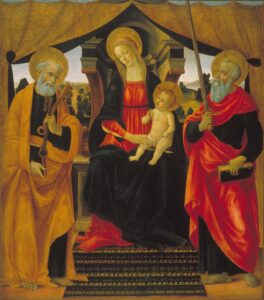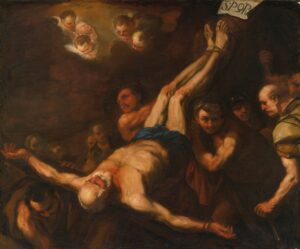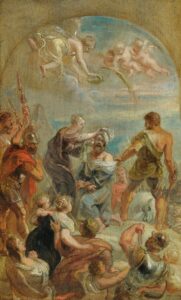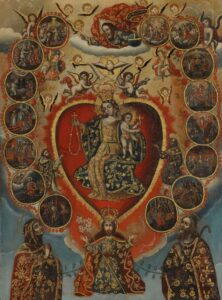Saints Peter and Paul
On this day, the blood of the two apostles of Rome, the pillars of the Church, Peter and Paul, was poured out in sacrifice. Like his Saviour, St Peter was crucified, but out of humility, asked to be crucified upside down, esteeming himself unworthy to suffer as Our Lord. He was buried on the Vatican Hill and reposes exactly under the high altar of St Peter’s Basilica. Paul, as a Roman citizen, could not be legally crucified, nor could he be executed within the walls of the city. This is why he was beheaded outside the walls, at the present location of the basilica that bears his name, St Paul Outside the Walls.
The celebration of this day is one which brings before our eyes many truths of our faith, the first of which is that God Incarnate chose to provide for the permanence of His Church throughout the ages by means of men upon whom He conferred His priesthood with the charge of ordaining others in their turn so that in every age, the apostles would have successors to teach the truth of Christ and confer His saving grace through the sacraments.
When we examine the lives of the apostles, we are rightly stunned by the fact that they began to preach the Gospel of humility, the Gospel of poverty, and the Gospel of chastity in a world hellbent on pride, luxury, and lust. All the odds were against them. As St Leo the Great says in one of his homilies for this feast, from the mistress of iniquity, Rome became the master of virtue and holiness. What could possibly have been the cause of such a transformation? How can it be explained? How is it that of all the statesmen Rome produced throughout the centuries, the two names that everyone has spontaneously on their lips when we speak of the eternal city are Peter and Paul, both of whom were from an obscure corner of the Roman Empire and both of whom were put to death by Roman authorities? How can we explain that this year, an estimated 32 million pilgrims will go to the eternal city in order to visit not the monuments of the Caesars but the tombs of the apostles?
The answer to this question is found in the feast that we celebrated on Friday and that we usually solemnise on this Sunday, the Most Sacred Heart of Our Lord, the source of the love that burned in the hearts of Peter and Paul.

Peter, from the days he had the unexpected grace to meet Our Lord on the shores of the Lake of Galilee, through the formation of those three years spent with Him, the ordeal of the passion in which he failed his Lord, and the reparation made on the shore of the same Lake of Galilee after the Resurrection, had come to love Our Saviour with a love that was as tender as it was strong. We can get a hint of it in the words he writes in his first epistle: Having not seen Him, you love Him (1 Pt 1:8). In other words if you who have not even seen Christ with your own eyes love Him so much, how much more I who lived with Him for three years and shared His life and mission.

Paul’s call was unprecedented. A highly educated Pharisee, Paul hated Christ more than anything in the world. He was convinced that to follow Christ was to destroy the Law of Moses. But Christ had plans for Paul. While he was fuming with rage as he rode to Damascus, Our Lord deemed it was time to step in. In an instant, Paul is thrown to the ground, blinded by a light much brighter than any he had seen before. In what can only be described as a knockout blow, Christ made it clear to Paul that he had gotten it all wrong and that he had better change course. Note that Paul could have refused to give his consent to this self-revelation of Our Lord. Grace never forces anyone, even if, at times, resistance becomes difficult. It is hard for thee to kick against the goad, Our Lord says to him (Acts 9:5). Hard but still possible. Paul does not resist, however, and this is where we see that in his persecution of Christians, he was in good faith. He asks a question, and in this question, we have all of St Paul: Lord, what wilt Thou have me to do? (Acts 9:6). Indeed, the question summarises the entire spiritual life. Lord, what wilt Thou have me to do? I am here at Thy disposal, and I am prepared to go anywhere and do anything it may please Thee to command. If anyone has that disposition and keeps it, he is already well on the way to sanctity. In Paul’s case, his exceptional mission would be marked with much suffering, as Our Lord says, I will shew him how great things he must suffer for my name’s sake (Act 9:16).

Returning to where we began, the pivotal moment in the lives of both Peter and Paul was that blessed day when they met Christ, albeit in very different ways and circumstances. It was from the encounter with Christ that they both truly learned to listen, to obey, to give of themselves, and above all, to love: to love Jesus Christ our Lord, and for the love of Christ, to love the sheep entrusted to their care. For any shepherd of souls, of whom Peter and Paul are the supreme models, the ultimate examination of conscience is based on those words Christ spoke to Peter on the shore of Lake Tiberias: Lovest thou me? And every shepherd should be able to respond wholeheartedly: Lord, thou knowest all things: thou knowest that I love thee. Then and only then can he hear and heed the Saviour’s reply: Feed my sheep (Jn 21:17). Only then can the prophecy be fulfilled, which foretells how the true shepherd may ultimately be called to die for his sheep: Amen, amen, I say to thee, When thou wast younger, thou didst gird thyself and didst walk where thou wouldst. But when thou shalt be old, thou shalt stretch forth thy hands, and another shall gird thee and lead thee whither thou wouldst not. And this he said, signifying by what death he should glorify God (Jn 21:19).
Among the many images used by the ancients to describe the Sacred Heart was that of a thurible, in which burning hot coals are placed, and onto which incense is poured, then consumed as a sweet-smelling offering to the glory of God. Peter and Paul were that incense of the most perfect variety; through their contact with Christ and with His burning passion for souls, they spread the wholesome savour of Christ throughout the world, as Paul tells us: For we are the sweet fragrance of Christ (2 Cor 2:15). Peter and Paul were both drawn into the burning furnace of the Heart of Christ. They were enraptured, consumed by its heat to the point of themselves becoming fire that set all the world ablaze with love for the Triune God.

In this, the apostles we honour today are not only our teachers but also our models. We look up to them with awe and veneration, but as we do so, they seem to smile down upon us and say: “What we did, so can you. Christ has no hands on earth now but yours, no feet but yours. Just as we walked the paths of the Roman Empire to preach the Gospel for the first time, so must you now, wherever you are, bear witness to the truth of our sweet Saviour. It will be hard at times, but if you plunge yourself frequently into the Sacred Heart of Jesus, the fountain of all holiness, you will learn to allow yourself to be poured out in sacrifice and consumed in the love of Christ. You too will become burnt-out incense, a sweet aroma for the glory of God and the salvation of souls”.

